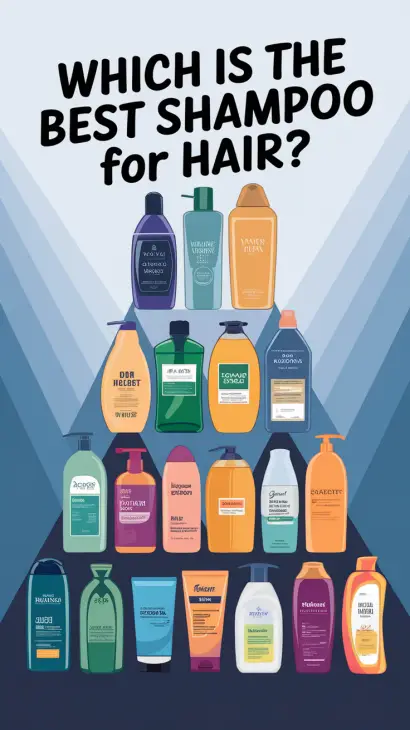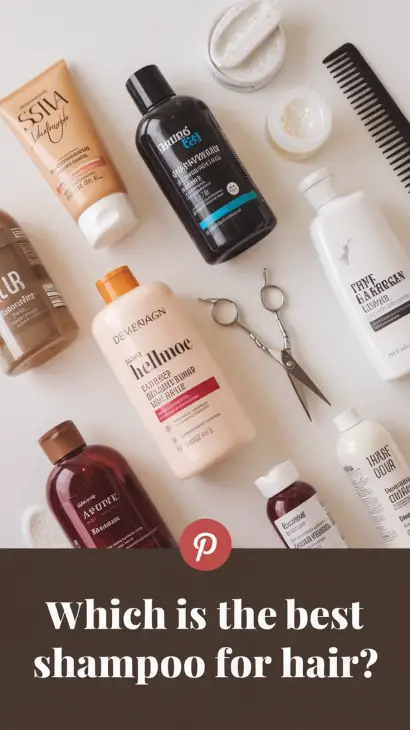Which Is the Best Shampoo for Hair?
Have you ever wondered which shampoo truly works for your hair? With so many options, it’s no surprise that picking the best shampoo can feel daunting. Whether your goal is to address dandruff, retain color vibrancy, or boost volume, the right shampoo plays a vital role in achieving healthy, beautiful hair. Let’s explore how to identify the perfect match for your needs.
Understanding Hair Types and Choosing the Right Shampoo
How Hair Type Influences Shampoo Selection
The first step to finding the best shampoo is understanding your hair type. Different hair types require different care, so choosing a shampoo tailored to your needs ensures better results.

| Hair Type | Recommended Shampoo Features | Best Ingredients |
|---|---|---|
| Oily Hair | Clarifying, lightweight | Tea tree oil, lemon extract |
| Dry Hair | Hydrating, sulfate-free | Argan oil, aloe vera |
| Curly Hair | Anti-frizz, moisturizing | Shea butter, coconut oil |
| Fine Hair | Volumizing, non-greasy | Biotin, collagen |
| Color-Treated Hair | Color-protecting, gentle | Keratin, UV filters |
| Sensitive Scalp | Soothing, hypoallergenic | Chamomile, oat extract |
Common Shampoo Ingredients and Their Benefits
Here’s a quick breakdown of popular shampoo ingredients to look for based on your hair concerns:
| Ingredient | Benefit | Avoid If… |
|---|---|---|
| Sulfates | Effective for cleansing and oil removal | You have dry or color-treated hair |
| Silicones | Adds shine and smoothness | You want lightweight products |
| Keratin | Strengthens and reduces breakage | Rarely problematic |
| Essential Oils | Hydrates and nourishes hair | You have allergies to fragrances |
| Aloe Vera | Soothes scalp irritation | Rarely problematic |
Matching Shampoo with Hair Concerns
Dealing with Oily Hair
Oily hair can benefit from shampoos labeled “clarifying” or “oil-balancing.” These products help control excess sebum production while providing a refreshing clean.
Managing Dry and Damaged Hair
Opt for moisturizing shampoos infused with hydrating oils such as argan or avocado. A sulfate-free formula is ideal to prevent further damage.
Preserving Color-Treated Hair
Choose sulfate-free shampoos designed to maintain color vibrancy. Look for UV filters to protect against fading caused by sun exposure.
Eco-Friendly and DIY Shampoo Options

Environmentally Conscious Shampoo Choices
Eco-friendly shampoos are gaining popularity for their sustainable packaging and natural formulations. Some top options include:
| Brand | Features | Best For |
|---|---|---|
| Ethique | Solid shampoo bars, zero waste | All hair types |
| Love Beauty & Planet | Biodegradable formulas | Colored hair |
| Aveda | Vegan, organic ingredients | Sensitive scalp |
DIY Shampoos for Natural Hair Care
For those who prefer natural alternatives, DIY shampoos can provide gentle cleansing without chemicals.
| DIY Shampoo | Ingredients Needed | Ideal For |
|---|---|---|
| Baking Soda Rinse | Baking soda, water | Oily scalp |
| Coconut Milk Blend | Coconut milk, honey, olive oil | Dry, frizzy hair |
| Apple Cider Vinegar Mix | Apple cider vinegar, water | Dull or lifeless hair |
Tips for Selecting the Perfect Shampoo

What to Consider When Choosing a Shampoo
- Understand Your Hair Type: Start by assessing whether your hair is oily, dry, or normal.
- Check the Ingredients: Look for beneficial ingredients and avoid harsh chemicals.
- Rotate Products: If your scalp becomes unresponsive, try alternating shampoos for balance.
Conclusion
Choosing the best shampoo for your hair isn’t just about the label—it’s about understanding your hair’s needs and the ingredients that will meet them. Whether you go for a store-bought product or a DIY formula, the right choice can elevate your hair care routine. Experiment, listen to your hair, and don’t be afraid to try something new!
FAQs
Q1: Can I use the same shampoo every day?
It depends on your hair type. Daily washing works well for oily hair but can strip natural oils from dry or curly hair.
Q2: Are sulfate-free shampoos better for everyone?
Not necessarily. While they’re gentler, some individuals with oily hair benefit from sulfates.
Q3: How often should I use a clarifying shampoo?
Once every two weeks to remove product buildup and deeply cleanse your scalp.
Q4: Can I mix my shampoo with natural oils?
Yes, adding a few drops of essential oils like lavender or tea tree can boost your shampoo’s effectiveness.
Q5: What is the best shampoo for dandruff?
Look for shampoos with zinc pyrithione or ketoconazole to combat dandruff effectively.
